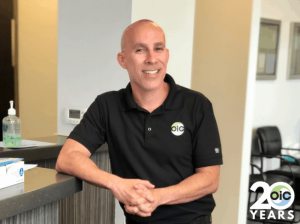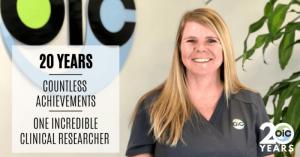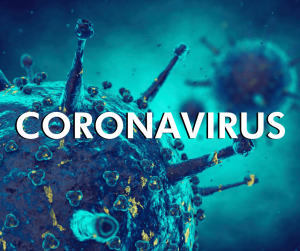What Is Usually the First Sign of HIV?
- What is HIV?
- What are the signs of an HIV infection?
- What is an HIV test?
- What if my HIV test result is positive?
HIV, or the human immunodeficiency virus, exists within the bodies of more than 1.2 million Americans. Each year, more than 35,000 new infections emerge. If left untreated, the virus can lead to acquired immunodeficiency syndrome (AIDS).
Since the beginning of the AIDS epidemic, more than 700,000 Americans have died from complications stemming from this disease. Even though HIV is no longer in the news all that often, it is clear that the disease continues to make an impact in this country. This blog will help you understand HIV, the symptoms of the disease, and how you can get help.
What Is HIV?
HIV stands for “human immunodeficiency virus.” We believe HIV came from the infected blood of chimpanzees in Central Africa. Some studies show this leap between species could have happened as far back as the late 1800s. Over time, HIV spread slowly but steadily across Africa and into other parts of the world.
In the early 1980s, doctors discovered a cluster of untreated HIV-positive patients who developed complications from what would later be called AIDS. In September 1982, the U.S. Centers for Disease Control and Prevention used the term AIDS and defined what this life-threatening illness looked like. Doctors learned that HIV could be transmitted in the blood and bodily fluids from infected people. By 1997, AIDS-related deaths in the United States were on the decline.
Today, we understand how to prevent the spread of HIV. Although we currently don’t have a cure for the virus, there are treatments available to help manage the disease.
New medications help people living with HIV to live long, happy lives. Taking these medications can reduce the viral load of HIV in your blood to the point where it is undetectable, reducing the chance of passing HIV to an unprotected partner or on to an unborn child.

What Are the Signs of an HIV Infection?
Fever is usually the first sign of an HIV infection. Many people also experience other flu-like symptoms as the disease manifests itself two to four weeks after exposure. This early, acute phase of HIV can last up to several weeks. Some of the other possible signs of the infection include:
- Chills
- Cough
- Diarrhea
- Fatigue
- Headache
- Mouth sores
- Muscle aches and pain in the joints
- Night sweats
- Skin rash
- Sore throat
- Sores in the mouth
- Swollen lymph nodes
- Weight loss
Knowing you have HIV is almost impossible without a test. That’s because the disease can masquerade as other illnesses and sometimes may not have symptoms at all at first. At least 13% of people with HIV don’t even know they have the virus. This makes it much more likely that they will spread the disease to others. If you’ve had unprotected sex recently, the only way to know if you have HIV is to get tested.
What Is an HIV Test?
A confidential HIV test can be performed by your doctor. There are three types of tests that look at your bodily fluids to check for signs of HIV: nucleic acid tests (NAT), antigen/antibody tests, and antibody tests.
- NAT tests require drawing your blood to look for both the presence of HIV and how much of the virus is present, known as your “viral load.” The benefit of a NAT test is that it can detect HIV earlier than other types of tests. The downside is that these tests are very expensive. Typically, we use this test if you’re exhibiting HIV infection symptoms or if you’ve had a high risk of exposure to the virus.
- Antigen/Antibody tests also draw blood, although there is a rapid test that requires a finger stick. This type of testing searches for antibodies that are produced in the blood by your immune system to fight the HIV invading cells. If HIV is in your body, you will produce an antigen called p24. The test looks for p24 as well as the antibodies that signal your body is fighting the infection.
- HIV Antibody tests just look for antibodies to HIV in your blood or oral fluids. These tests also require blood to be drawn from a vein.
The time for receiving test results spans several days to less than a few hours. Talk with your doctor about what type of test is right for you.

What If My HIV Test Result Is Positive?
If you had an antibody test and the result was positive, the first thing to do is get a follow-up test to confirm the results. If the follow-up test is positive, it means you have HIV. We know how stressful this diagnosis can be. You will feel many emotions such as anger, fear, or sadness.
Having HIV does not mean you have AIDS, which is the most severe and advanced form of the illness. Please know that millions of people live decades with HIV and have full, happy, productive lives. To start down that path, the next step after your diagnosis is to get HIV treatment immediately.
Antiretroviral therapy (ART) is the process of taking medication to treat your HIV infection. While ART cannot cure HIV, it can keep your symptoms from progressing. Reducing the HIV in your body also means that you lower the risk of transmitting the disease to someone else. Everyone who has HIV, no matter their symptoms, typically takes medications to lower the viral load in the body.
Today, we have a variety of medications available to treat your HIV. There are seven classes of drugs, all with different effects on the body, so talk with your doctor about a personalized drug therapy regimen designed specifically for you, your body, and your treatment goals.
A diagnosis of HIV, while serious, doesn’t mean your health has to decline. Get tested, and talk with the team at the Orlando Immunology Center about your options.
More Articles
Dr. DeJesus Recognized by Orlando Magazine
For the 5th consecutive year, Dr. DeJesus has been recognized by his peers in Orlando Magazine for his work as medical director at Orlando Immunology Center. Dr. DeJesus is a graduate from the University of Puerto Rico, School of Medicine. He completed his Internal Medicine training and Infectious Disease fellowship at the Medical College of…
Read MoreJoin OIC at the 2015 AIDS Walk Orlando
Orlando Immunology Center is pleased to announce that we will again be sponsoring a team at this year’s 2015 AIDS Walk Orlando. If you are interested in joining our team or donating to this worthwhile cause, please let us know. Saturday, March 28, 2015 In Florida, 15% of all new HIV infections reported among females…
Read MoreOIC Wins Wave Award for Favorite Local Healthcare Professional
The Orlando Immunology Center (OIC) announced today they have received the Central Florida/Orlando 2015 Watermark Awards for Variety and Excellence (WAVE) Award for favorite local healthcare professional. “We see this as a huge honor and will continue to do everything in our power to help patients from all walks of life be healthy, happy and…
Read MoreBest of Luck on Your New Adventure
Best of Luck, Love Your Family We’re a family. And just like every family, we go through triumph and tragedy together – sometimes both in the same day. Today is one of those days as we wish someone we love best of luck on their new adventure. Omar Marquez, LPN, CCRC, one of our Clinical Research Coordinators,…
Read MoreWendy Reflects on Her 20 Amazing Research Years at OIC
“Incredible progress” – Wendy reflects on how much has changed in her 20 years of amazing research at OIC but adds “I’m staying until we find a cure for HIV.” Every field sees change over time, but not as much as the field of HIV. Twenty years ago there were few medications with many side effects.…
Read MoreEverything You Need To Know for Free Leaders of Color Training
Are you a person of color living with HIV and want to make a difference? Do you want to be a part of ending HIV in Orlando? Are ready to serve as a leader? Then this free leaders of color training is for you! Where: Heart of Florida United Way, 1940 Traylor Blvd., Orlando, FL 32804 When: July…
Read MoreMassive 500 Percent Increase in Prep Use; New Research
There’s been a massive 500 percent increase in PrEP. But is that enough to end HIV? New research shows a massive 500 percent increase in PrEP use to prevent HIV. During 2014 to 2017, several key aspects of HIV prevention dramatically increased. Which is great news! But these improvements were not across all groups. Moreover, only about one third…
Read MoreWhy Preventive Medical Care Matters to You
We only have one life! So live your happiest, healthiest life through prevention! What is preventive medical care? Preventive medical care is any medical service that will help prevent an emergency or chronic condition. “I’m active and feel great – I don’t need a doctor!” That’s the entire purpose! To keep you that way! It promotes an…
Read MoreHow to Easily Get Medically Prepared for a Hurricane
Getting medically prepared for a hurricane is easier than you think. But it could be even more important than your typical hurricane prep routine. Hurricanes are erratic, powerful and destructive forces of nature. In addition, they can rapidly grow stronger. Or even decrease in strength but stall bringing wind and rain for extended periods of…
Read MoreOIC COVID-19 Response
During this most difficult time, we at OIC strive to continue to take the best care of you and all the health needs of our patients. Due to the severity of the situation involving the Coronavirus (COVID-19), we have had to implement many (temporary) changes in the best interest and the safety of both our…
Read MoreFrom SOCIAL to PHYSICAL Distance
SARS-CoV-2 (SARS-2), the virus that causes COVID-19, spreads from person to person through respiratory droplets produced from an infected person, even if that person does not know he/she is already infected. Most transmissions occur during very close contact with an infected person or when an infected person coughs or sneezes around you. A six-feet parameter…
Read MoreCOVID-19 Basic Immune Response
Just for clarification: SARS-2 is the virus that causes COVID-19. The current COVID-19 PCR test measures viral RNA. It does not measure our immune response to the virus. Viral RNA is only found in blood with active viral infection (or for a short period of time after recovery). In fact, in theory, we should get…
Read MoreInterim Guidance for COVID-19 and Persons with HIV – Updated: March 20, 2020
This interim guidance reviews special considerations for persons with HIV and their health care providers in the United States regarding COVID-19. Information and data on COVID-19 are rapidly evolving. This guidance includes general information to consider. Clinicians should refer to updated sources for more specific recommendations regarding COVID-19. Guidance for all Persons with HIV In…
Read More











